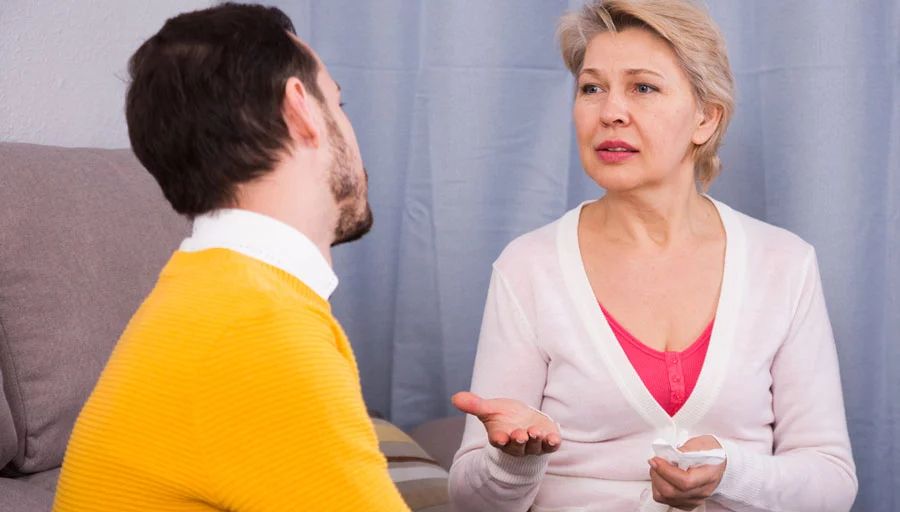Understanding Enmeshed Family Characteristics
At first glance, an enmeshed family seems like they are really close. While you may think a close family is a good family, the reality is that it is very possible to have too much of a good thing.
Enmeshed families lack boundaries. Parents are often overly involved, and dependent on their children, and may even make children feel guilty for developing individuality or separating from the family unit. This creates problems that often continue into adulthood, particularly if adult children follow their own path or try to separate from the family.
Unfortunately, enmeshment in families is one of those generational curses that are hard to unlearn. You may even struggle with your sense of self as an adult. But, that doesn’t mean that healing isn’t possible, especially when addressed during treatment at Catalina Behavioral Health.
Let’s take a closer look at what an enmeshed family is and how Catalina can offer insights for healthier relationships with friends, your partner, and your children today!
Get Help at Catalina and Begin Healing Today!
What is an Enmeshed Family?
Enmeshment describes family relationships that don’t have healthy boundaries. While it’s okay to be a close-knit family, enmeshed families have a dysfunctional family dynamic that makes it hard for children to become independent. Enmeshed family members may also struggle with having healthy relationships outside of the family.
Usually, enmeshed families are dysfunctional in one of two ways. First, parents may be overreliant on their children. This can refer to being overly reliant on them in an emotional way or children might be expected to fulfill an adult role, like paying bills, managing money, or taking care of siblings.
Enmeshment could also mean that a child is discouraged from forming their own identity. Parents may put a lot of pressure on their child or children to meet certain expectations or follow certain values or beliefs. These children often have trouble establishing their own interests and individuating from the family, even as adults.
How Do Enmeshed Families Differ from Close Families?
At first glance, close families might seem like a great model of healthy family relationships. However, when family closeness exists without enmeshment, healthy boundaries are in place. There can be boundaries in enmeshed families, but they are often boundaries that discourage family members from interacting with people outside the family unit.
Members of the family can meet their own needs and have a separate sense of who they are individually. While they may contribute to the family unit, there are clear roles and this is done in a way that helps the child establish personal responsibility.
Characteristics of Adults in Enmeshed Families

Enmeshed relationships are most common between parents and their children. This leads to a dysfunctional parent-child relationship. Enmeshed parents often:
- Feel that they need to know everything that is going on in their child’s life
- Have a life that centers around their child’s life and accomplishments
- Expect children to have certain values and adhere to their religious or spiritual beliefs
- Treat children like a friend and use them for emotional support
- Overshare information that should be personal
- Have a sense of self-worth that depends on their child’s achievements
- Discourage their child from following their dreams and developing their own identity
- Reward behavior that strengthens the family enmeshment
Often, these strong bonds between parent and child exist even as the child becomes an adult. An enmeshed parent often still has high expectations for their adult child. They may expect things like fierce loyalty and either emotional or financial support.
Characteristics of Children in Enmeshed Families
Children with enmeshed parents also have specific traits. As adults, they may also have family enmeshment trauma that makes it harder for them to have a healthy family and maintain other adult relationships. Here are some signs of enmeshment that you may experience:
- Low self-esteem or sense of self
- Feelings of guilt when you set personal boundaries for physical and emotional space
- A strong focus on other people’s needs over your own
- Feeling responsible for fixing any problems the family may face
- A desire to reach for goals your parents have set for you instead of focusing on what you want
- Aversion to conflict and difficulty telling people “no”
- Confusion about their role in the family
- Difficulty pursuing your own goals and interests
As someone with a parent who was more of a “friend” than a responsible adult, I can attest to all the ways that a strained parent relationship like this impacts your life in the long term.
Below, we’ll talk more in-depth about signs of enmeshment and what you can do if family enmeshment is negatively impacting your life.
Is Enmeshment a Mental Illness?

No, enmeshment is not a mental illness or mental health diagnosis on its own. Enmeshment describes a type of dysfunctional family functioning. While it can have negative implications and affect your mental health and other relationships, the family relationship and its dysfunctional relationship pattern are not mental illnesses.
However, it’s not uncommon for children from enmeshed families to develop mental illness from things like struggling to meet their parents’ expectations and not having their emotional needs met. Some common mental health conditions associated with having enmeshed parents include anxiety, depression, eating disorders, and substance use disorders.
Boundaries Are Important in All Relationships
All relationships require boundaries, whether it is a relationship with a coworker, your boss, family members, your spouse, a friend, or your child. Your personal boundaries create safety in relationships. They also help establish roles and set expectations for the nature of the relationship and what is okay. Without boundaries, relationships can feel one-sided.
Relationships with nonexistent boundaries can also be very toxic. For example, imagine that your boss was constantly contacting you outside of normal office hours and expected a response. If you communicated your work hours and they continued to disrespect them, it would be stressful for you.
Learn More About Our Rehab Family Programs Now!
How Enmeshed Family Dynamics Impact Adult Children
Parental enmeshment can present in a few ways and many of these ways go on to affect children in their adult lives. Additionally, when enmeshment is the family model that children learn from, it’s possible they think that their parent-child relationship is normal.
This can lead to a delay in seeking treatment and handling the problems that often result from growing up in an enmeshed family.
Parentification
Parentification describes a family relationship where the children are expected to give to the parent(s). This can be emotional parentification or instrumental parentification.
With emotional parentification, the child is the main source of advice. They might mediate between members of the family or the parent may rely on them for emotional support. In this type of parentification, children often don’t have the personal space or boundaries to prioritize their own emotions.
Instrumental parentification occurs when the child takes on parental responsibilities in the home. They may be expected to take care of the home, pay the bills, or care for their siblings in a way that goes beyond learning personal responsibility.
With either type of parentification, the child might have trouble separating themselves from the family even as an adult. Parents may make the child feel guilty for having their own life, not providing them, or not constantly being available to provide emotional support.
Low Self-Esteem and Sense of Self

Children who have grown up in enmeshed families often do not have their own identities. Your identity is something built through making decisions and committing to the things that you find important. This sense of identity is often built in adolescence when children start separating from their parents and becoming more responsible.
In enmeshed families, children never get that chance to branch out on their own and develop their sense of self. Even as an adult, they may struggle with having their own emotional identity and seeing themselves as an individual, not just an extension of the family unit.
When you don’t have a strong sense of self, it makes it hard to establish boundaries and understand what is important to you. As a result, enmeshed children often struggle with self-esteem and prioritizing their own needs. They also may not be comfortable taking those healthy risks that are necessary for success and personal growth.
Codependent Relationships and Enmeshment Trauma
Enmeshed children have poor models for healthy relationships during the most critical years of their development. Because they normalize these types of relationships, it’s not uncommon for them to be codependent in their adult relationships.
In codependent relationships, there is an imbalance of power. One partner commits more time and energy to the relationship. Often, they’ll even put their own needs aside to prioritize their partner’s needs. These romantic relationships are often toxic and unhealthy for both people involved.
Furthermore, you might struggle with a fear of abandonment. This stems from having a parent that was only loving when you followed certain rules or behaved in a certain way.
Difficulty Maintaining Healthy Adult Relationships
In addition to problems maintaining friendships and romantic relationships, enmeshed children might struggle to develop healthy families of their own. Enmeshment is often passed down for generations. It continues until you finally challenge learned behaviors and commit to healing your relationship with yourself and the people around you.
Troubles with Conflict Resolution
Children who grow up in enmeshed families develop a sense of responsibility for other people’s emotions. This makes it hard to prioritize yourself. Instead, you may focus more on making other people happy.
This can also make it hard to be assertive and have your emotional needs met. Often, children from enmeshed families cannot soothe their own emotions. This can lead to seeking comfort in other places or using unhealthy coping mechanisms, rather than developing healthy conflict resolution tools.
Healing from Enmeshment and Improving Family Relationships

The good news is that even if you grew up in an enmeshed family, you don’t have to struggle with dysfunctional relationships forever. You can heal! Whether you’re seeking individual or family therapy, Catalina Behavioral Health can provide the support you need to heal unhealthy dynamics.
Understanding Healthy Family Dynamics
As a child growing up in an enmeshed relationship, it likely shaped your sense of what family cohesion should look like. Unfortunately, family enmeshment is not a good example of healthy relationships.
Before you can get help, it’s important to understand what a healthy relationship looks like. Once you’ve realized that your family functioning might not be healthy, you can start taking the steps to be better.
Family therapist Salvador Minuchin is one of the earliest people credited for his research and therapy techniques for enmeshed families. In cases of enmeshment, what looks like strong family bonds is actually family instability. By treating this instability and setting boundaries, the entire family can heal.
Therapy with Other Family Members
It is possible to change enmeshed relationships, even decades later. In instances where family members are willing to work on changing enmeshed family dynamics, family therapy is a great course of treatment. A family therapist may talk with you individually, as well as do group sessions with family members.
Of course, not all family members may be willing to admit to the enmeshment or seek help. Even if family therapy is not an option, Catalina Behavioral Health can help heal enmeshment trauma.
Learning to Set Emotional and Physical Boundaries
A big part of both individual and family therapy is learning to set healthy boundaries. Whether physical boundaries or emotional ones, they are critical for any type of relationship, not just when you live in a close family.
Catalina Behavioral Health can help you connect with a therapist who will help you identify flawed relationships that lack boundaries. Alongside our rehab family program, doing ongoing work with a therapist can guide you in creating healthy boundaries, teach you what these boundaries should look like, and help you communicate them clearly in your relationships.
Cognitive Behavioral Therapy

One of the most effective tools for healing enmeshment trauma is cognitive behavioral therapy (CBT). Enmeshment in families changes your brain chemistry and thought patterns. These thought patterns affect what you believe and how you act.
During CBT treatment, you’ll learn about dysfunctional thought patterns and how they shape what you believe. You’ll also learn techniques for challenging these thoughts.
As you continue to challenge your thinking patterns, it eventually reshapes the way that you think. CBT is an effective type of psychotherapy, not just for treating enmeshment but also for improving mental health.
Get Help for Yourself and Your Family – Reach Out Now!
Let Catalina Help You Set Healthy Boundaries and Recover!
Parental enmeshment is something that impacts future relationships and stops you from setting and achieving goals. Programs like those offered through Catalina Behavioral Health can help you start setting healthy parental boundaries so you can break free from your parents.
From family counseling to individual therapy, with the right resources in place, there’s no reason you can’t leap over those obstacles to being an emotionally healthy adult. Contact us to get options for that support in place today!







